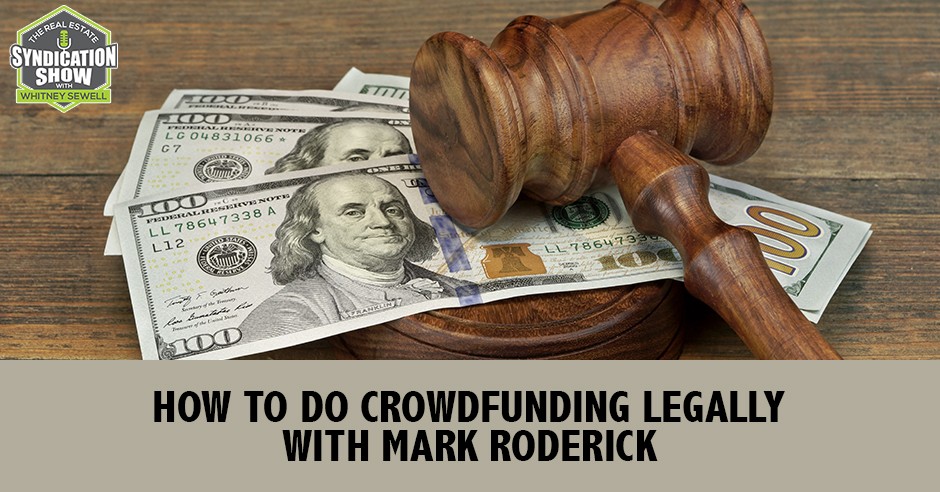
Listen to the podcast here:
Raising money without begging investors is no easy task for startups. At times, help from a third-party individual is needed to make it happen. But how do you know if you are legally paying brokers to raise capital and not breaking any law or guides set by the Securities and Exchange Commission? Mark Roderick is a crowdfunding attorney who has represented entrepreneurs and their businesses successfully for more than 25 years. In this interview, he explains what a broker is, and the legal process that raising money entails. He cites examples of the repercussions of hiring an unlicensed broker-dealer, gives advice on the lessons he has learned in the industry, and touches on his blog that tackles crowdfunding.
Our Gracious Sponsor:
Are you tired of answering emails from investors about when they’ll receive their K-1s?
Let The Real Estate CPA handle the accounting and taxes on your next syndication and they’ll file your tax returns by March 15th so you can get K-1s to your investors by the individual filing deadline on April 15th.
Not only will this reduce headaches, but it will help you retain investors over the long-term by improving investor experience.
The Real Estate CPA is now offering a Special Virtual Workshop to the listeners of The Real Estate Syndication Show on How to Answer Tax Related Questions from Your Investors!
Learn more today by visiting: http://bit.ly/TheRealEstateCPA-Syndication
—
Watch the episode here:
]
How To Do Crowdfunding Legally with Mark Roderick
Our guest is Mark Roderick. Thanks for being on the show, Mark.
Thank you very much for having me, Whitney.
I’m excited to have Mark on the show. He is a crowdfunding attorney who has represented entrepreneurs and their businesses successfully for more than 25 years. He represents companies across a wide range of industries, including the technology, real estate, and healthcare industries. He writes and lectures on the topics of raising money from investors, franchising laws and business contracts. Mark, thank you again for being on the show. I love having experts that’s been in the industry for many years and it’s very valuable to the audience and to myself. Tell the audience a little more about your background and what your focus is.
I have represented entrepreneurs for a long time. I always joke, I started practicing law in 1840. I’ve been representing entrepreneurs ever since in all this stuff that entrepreneurs do. One of the things entrepreneurs do a lot of is try to raise capital, particularly real estate entrepreneurs. I always say that if you’re speaking to a real estate guy and he’s not looking for money, call 911 because he’s probably not breathing. This is capitalism. After all, capital is the lifeblood of American business. Real estate in particular needs a lot of it. It’s a very capital-intensive industry. Among lots of other stuff like buying and selling businesses, I have helped lots of folks raise money since 1840. That’s why when the JOBS Act came on the horizon, I said, “This is transformative and disruptive and super cool. That is going to be an exciting space.” For a few years, I spend all my time helping people raise money using one form of crowdfunding or another. That basically means real estate syndication and that is the title of your show.
I appreciate your time laying that out because you are definitely an expert and somebody we want to talk to. Every conference I go to, I get questions about this, of how other people in the industry are doing this, how people raise capital for other syndicators and how they’re compensated and how we do that legally? There are tons of things we could talk about, but I’d love for us to dive into that a little bit. Some things we need to know, as we’re raising capital for other investors, how do we that legally and make sure they’re doing it legally then when we become the operator, what that looks like as well.
You were kind enough in our pre-recording conversation asked me whether you could ask that question and I said, “Absolutely.” It’s an important question. It’s a question that lots of clients ask me from both sides of the aisle, so to speak. It’s a super interesting question. I will warn you in advance that the answers are not very satisfactory and you will understand what I mean. The good news is that you and your readers will know, at least at a high level, everything there is to know about the topic once I’m finished talking. It’s not going to leave you with a warm satisfied feeling. The first thing I’ll do is tell you and your audience that I maintain this blog. On my blog, I write stuff about legal issues, trying to answer questions that my clients ask. That question gets asked a lot. Not too long ago, I wrote a blog post on this topic called Using Finders in Crowdfunding. If anyone wants more information, they could look at that blog post, which is necessary because it’s written and well-thought out. It’s going to be perhaps more detailed and has more information than you are about to read.
[bctt tweet=”Shaking a finger and saying, ‘There will be dire consequences if you continue to do this,’ doesn’t do anything.” username=””]
Raising money for people and being paid for it. The first part of the issue is, “Can you raise money for other people?” The answer is, “Absolutely.” Do your darndest. It’s the second part that is legally difficult. How do you get paid? Let’s have a basic hypothetical. Let’s say one of your buddies is raising $2 million to buy some multifamily project and you know a few investors who might contribute $500,000 of it. You say to him, “I’m happy to bring these folks into the deal. Obviously, I want to be compensated for it in some ways.” This is the legal issue around that arrangement. The legal issue is broker-dealers. In the Securities Laws, in particular, under the Exchange Act of 1934, anybody who was acting as a broker or a dealer has to be registered as such with the SEC. Being registered as a broker-dealer is a big deal. It’s not a little deal. There are broker-dealers out there that it’s an expensive and time-consuming process to get licensed as a broker-dealer.
When your friend is raising money from these investors, he’s selling securities, everyone in the syndication business understands that from a technical, legal perspective, your friend is selling securities to people. The definition of a broker in Section 15 of the Securities and Exchange Act is anybody who deals with securities for the account of another as part of the business. Who are you thinking of? You’re thinking of Morgan Stanley and other folks like that. If you are compensated, even in that little transaction by your friend for raising money to bring him investors, you are or at least maybe, acting as a broker. If you are acting as a broker without being licensed as a broker, it’s more commonplace. There are people called real estate brokers. People go out and sell your house, they get a 6% commission.
If you just open your shingle one day and say, “I’ll help you buy and sell houses, pay me off 6% commission,” and you’re not licensed as a real estate broker, you get in trouble. The same is true but at a higher level for acting as a securities broker without being licensed. If that happens, if you are acting as a broker, whether from ignorance or just because, “I want to do this no matter what the law says,” there are two possible consequences. One, which is what everyone thinks about is very unlikely to happen, and that is the SEC knocks on your door and send you to jail or does something to you. It’s very unlikely to happen because the SEC probably has to devote most of its manpower these days to Elon Musk alone. The SEC has very limited manpower. It’s probably not coming after Whitney Sewell on the basis of a $2 million real estate transaction. That is one thing that could happen but is unlikely to happen.
The thing that is more likely to happen is this. You bring your friends in, your buddy pays you a 5% commission for bringing in this $500,000. You take away $25,000. The deal goes south. One of those investors, who didn’t need to be one of your guys, but any of the investors in the deal gets wind of what happens and happens to have a brother-in-law who is at a cocktail party one day and speaks with someone like me and describes the situation. I say, “That’s interesting.” If they used an unlicensed broker in that transaction, then that was an illegal offering and everybody has the right to get their money back. The brother-in-law’s ears perk up and before you know it, someone’s filing a lawsuit against you, the unlicensed broker and your buddy, the guy who used an unlicensed broker. Everyone is really unhappy and you’re very sorry you took that $25,000. That is, in a big picture, what the law is and what can go wrong.
The primary reason that all this is very unsatisfying is that these transactions happen all the time, as you personally know and as everyone in the real estate industry know. They happen every day. Lots of private real estate deals are funded in this way with compensation going back and forth and nothing ever happens. It is a funny and unsatisfying situation that the SEC knows this is going on. Every now and again announces to no particular purpose, that it knows it’s going on and doesn’t like it and shakes its finger and says, “There will be dire consequences if you continue to do this,” but doesn’t do anything. It doesn’t bring any enforcement actions.
The industry just toils on with all these finders out there taking commissions and lawyers like me pontificating, “You can’t do that,” and nothing happens. The shoe never drops. It can be very frustrating. It’s certainly frustrating for me. I hear from people all the time. My client will be approached by somebody, by an unlicensed person that says, “We’ve got $1 million,” pays 5%. I say, “Are you a broker?” They say, “What’s that?” I say, “You’re supposed to be a broker.” They say, and I’m sure they’re telling the truth, “Mark, we’ve been doing this for 25 years and you’re the first person who’s ever raised this question with us.” That’s very frustrating for my client. When I’m whispering my clients here, “You can’t do this.” The client’s looking around and saying, “Everybody does this.” It’s unsatisfying for that reason.

Let me move to the next level. It is possible in some situations to construct an arrangement that is legal. Let me give you two examples of arrangements that are legal. The first, a promote, in general. In general, because this is a very gray area, you could take a promote for bringing people into the deal. Let’s say your buddy is taking a 30% typical promote. He says to you, “If you bring in $500,000, I will give you 5% of my promote,” whatever it is, 5%, 10%. In general, and don’t ask me really to explain why because I couldn’t because there is no why, is that would probably be okay. A promote on the one hand is okay. Immediate cash commission, on the other hand, is not okay. That’s one pretty legal thing you can do.
The other thing you can do is there are such things as a legal finder’s agreement. For example, if you’ve never done this before, you’re not in this business, this is not how you make your income generally but you’re talking to your buddy, he says, “I have this multifamily thing. Do you know anybody?” You say, “I do know somebody. I went to college with so and so and he’s made $1 trillion selling some pharmaceutical company or something like that. I’ll introduce you to him. If he makes an investment, you pay me.” If that is done properly and your role is limited to a one-time introduction, you don’t try to sell the deal. You don’t make an investor presentation to your buddies. You’re just making it an introduction, that arrangement can be legal. Those are our two things that it can be legal.
The legal finder’s agreement, does that something we should have in writing before they refer somebody to you or a potential investor to you?
Yes, if you’re going to try to do it through a legal finder’s agreement, that should be in writing. It should limit the activities that you’re going to conduct. You’re not going to conduct any selling activities. You’re not going to go out and find investors. You are going to say, “I went to college with this guy, I will introduce you. If indeed he ends up making an investment, you’ll pay me some money.” That can be legal. There are a couple of ways that you can do it legally. There are a lot more ways that you can do it illegally. Unfortunately, the SEC allows this all to happen while making clear that it thinks that it’s all illegal. In other related areas, for example, in small mergers and acquisitions transactions. You had the same situation, a lot of finders out there introducing companies to one another in the hopes that A would buy B and pay the finder of commission. It’s the exact same issue. The SEC, after years of study, came out with a new rule that makes it clear that in some limited situations you can have unlicensed brokers in the MNA field. We keep hoping and waiting that the SEC will come out with similar rules for the unlicensed finders in small real estate transactions. It would make everyone’s life much easier but it hasn’t happened yet. I hope I have thoroughly confused everyone to your satisfaction.
As far as being the GP in the deal, the general partnership side or we’re going to raise capital, if there’s somebody that can raise capital and then instead of saying, “We’re going to pay you to raise capital for us,” which we understand now that you’ve clarified. We can’t do or word it like that anyway. If we bring them on the general partnership side, they have other duties and other things like that, is it questionable at all then?
It depends on how real those other duties. From that perspective, giving them a promote, allowing to share in the GP’s promote is probably going to be acceptable. Paying a commission is probably not going to be acceptable. As the scenario you refer to, I’ve seen a lot of agreements where people make up stuff, make up reasons why we’re paying this commission and say, “You’re going to be in charge of sending postage or sending letters to the investors and you’re going to have to talk with them and making up these reasons why we are paying 6% of the raise.” There’s a saying in law that is true in a lot of fields, which is, “Pigs get fat, hogs get slaughtered.” In my opinion, there is such a thing as being too cute with these finder’s agreements.
[bctt tweet=”Be in the right place at the right time. Have the right skillset for the place where the economy happens to go.” username=””]
When people look at these things, whether it’s a government lawyer working for the SEC or a plaintiff’s lawyer from that cocktail party, when you look at a piece of paper and it jumps off the page, we are trying to hide something because it’s so silly. It is listing all these duties of the finder that you know and I know and everyone knows they didn’t do. We wouldn’t have paid him for it if they did do all these silly things. What that’s telling the reader is, “These guys knew this was illegal, they’re trying to cover it up.” I don’t like to do that. Honesty is the best policy.
Planning to do the promote or a legal finder’s agreement ahead of time is going to be the best way?
Yes, absolutely.
You had briefly mentioned this and I thought we could talk about this a little bit more. As far as paying, it’s still a finder’s fee but like a referral fee of some kind. Is that going to be a specific amount or can we say per what this person invests? What can that look like? Somebody that wants to invest but they also help bring other investors to do your deal or they just tell their friends about it. Let’s say I didn’t even say anything to them about a finder’s fee or doing an agreement or anything. However, they tell their buddy about it and now, Buddy A wants to invest in the deal as well. Can I pay the first investor or pay him something to encourage him to keep doing that of course but to just say thank you?
The first part of your question, if you have a legitimate finder’s agreement, that scenario I said because you just happened to go to college with a guy who’s really wealthy. You can be paid an outright commission. If the finder’s agreement is otherwise legal, it will say that if your college buddy makes an investment, you get X percent of the amount he invests. That’s a flat out commission and that is legal if it’s in an otherwise legal finder’s agreement. Now, you’re saying, “What if a lot of people want that deal? What if that investor also has some friends?” You’re going to have to evaluate each of those arrangements separately, bearing in mind that pigs get fat, hogs get slaughtered.
He didn’t even know that I’ve paid anybody else to refer people or that we could even do a legal finder’s agreement. However, he just told his buddy at the club or while they’re golfing that, “This is what I’m investing in.” He says, “I want to know about it.” I want to pay him some money to thank him.

The way business works, a lot of things are legal. For example, if you’re a real estate developer and your buddy’s a real estate developer and you share investors sometimes and it works out for both of you, that’s perfectly legitimate. Where are you from?
Virginia.
If someone happens to give you tickets to the Final Four, in which the Virginia Cavaliers are a Final Four team or he and his wife take you and your wife out to dinner then to see the Final Four game. Those things are done and no one’s going to blink. There are lawyers saying, “That’s wrong if you do that too much.” In general, that’s okay, but once you start paying cash compensation for investors, you are back in the stew.
Mark, anything else as far as relating to this topic that I should be asking you about that maybe you get questions about that I haven’t asked you?
There are two groups of people who are allowed to get paid. One is actual brokers. There are folks out there, actual brokerage houses. A syndicator seeking to raise money can legally pay a licensed broker flat out commissions for raising money for a real estate investment. The other group, not so obvious that gets paid, is investment advisors. There are more and more investment advisors coming into the real estate syndication and crowdfunding space. This is the key, however, investment advisors are not paid by the syndicator. They’re not paid by the deal maker. They’re not paid by you. They’re paid by their clients.
You do sometimes see legal arrangements where, for example, a syndicator, your guy raising money for that multifamily deal, he’ll have two classes of shares. One for regular people and then another with a minimum investment of a $250,000 or something. Those will be sold through investment advisors only and they will be sold at a discount because of the volume, the larger minimum. The idea is that the investment advisor will then perfectly appropriately charge his or her client for bringing the deal to them. There’s enough money there for the investment advisor to be paid legally and that’s perfectly appropriate.
[bctt tweet=”If you enjoy what you do, you’re going to be pretty good at it because it doesn’t feel like work.” username=””]
Thank you for bringing that out. I wanted to ask you, what’s the number one thing that’s contributed to your success?
My career was turned out with the benefit of hindsight to be made for crowdfunding. That’s really one important aspect. I think you’ve talked to a lot of people. It’s being in the right place at the right time. Having the right skillset for the place where the economy happens to go, I’ve certainly seen that many times myself. Second, I think it’s so cool. It’s a cliché that if you really enjoy what you do, you’re probably pretty good at it because it doesn’t feel like work. I’m not going to say nothing I do feels like work. When you find something that you enjoy, it is amazing. It’s a virtuous cycle. I would say doing something that I enjoy, which is crowdfunding with all of its philosophical and economic components has contributed a lot.
Is there a way that you’ve improved your business that we could all apply to ours?
You are already doing it, I would say. Since I began practicing law in 1840, there was no such thing as podcasts or blogs or etc. It’s been an adjustment for me to adapt to the brave new world that we all live in. The brave new world of social media. You’re doing it here, you’re a host but you’re a young guy. What’s going to happen is, surprising though it may seem, in a fairly near time you will need to evolve also. The stuff that is so new and cool now will be superseded by something else. I think always learning, and that’s a cliché but it’s a cliché for a reason.
How do you like to give back?
I give back in part by doing podcasts like this. I do a lot of public speaking. I do a huge amount of writing on my blog. That blog is used by so many people. It’s an educational tool. I am super into the crowdfunding. I think it’s about the democratization of capital and rejuvenation of the American capitalist system. The more people I can educate about it, not just syndicators like you, but investors. The benefits that this is great not just from the syndicator’s point of view but from the investor’s point of view, the more I can get that message out. I get calls from all over the world from people. I will spend time on the phone and do with people from all over the world who read my blog and have questions. I definitely tried to give back and I think it’s effective in spreading the news.

Mark, tell the audience how they can learn more about you, your business and also this blog?
The URL of the blog is CrowdFundAttny.com. All my contact information is there. If you type in to Google, Mark Roderick crowdfunding, you will come across me 100 times. Once you start doing the research, it’s hard to avoid me. That’s what people tell me.
You are getting out there, you are growing and you’re getting out on social media a lot it sounds.
Social media is old news to your audience but it’s incredibly powerful. We’ve learned that social media is a powerful force for good and for not good. It is a powerful educational tool. The big picture social question is why with so much good information so freely available? Why is our society so unbelievably unknowledgeable about so many things from American history to vaccinations to everything else? It’s a conundrum. I don’t have a solution for that, but I do post truthful content on my crowdfunding blog.
Mark, you’ve been a great guest. I appreciate the extremely valuable content that you provided and also letting us know about your blog, and how we can pay people legally to raise capital or not. Thank you so much again for your time and I’d love to have you back on the show again sometime. I hope the audience will visit Mark’s blog and also go to Life Bridge Capital and connect with me. I’d love to have a call with you as well. Go to The Real Estate Syndication Show on Facebook so we can all learn this business and grow our businesses together from experts like Mark. Thanks again, Mark. We’ll talk to you soon.
Important Links:
- Mark Roderick
- Using Finders in Crowdfunding
- CrowdFundAttny.com
- The Real Estate Syndication Show on Facebook
About Mark Roderick
 I have represented entrepreneurs and their businesses successfully for more than 25 years. I represent companies across a wide range of industries, including the technology, real estate, and healthcare industries.
I have represented entrepreneurs and their businesses successfully for more than 25 years. I represent companies across a wide range of industries, including the technology, real estate, and healthcare industries.
Expanding on my in-depth knowledge of capital raising and securities law, I am spearheading Flaster/Greenberg’s Crowdfunding Practice. I am also a member of the firm’s Mergers and Acquisitions, Business and Corporate, Taxation and Healthcare Groups.
Effective legal representation involves much more than technical competence. It involves two things: first, the ability to listen hard and hear what the client is really saying; and second, the knowledge and experience to achieve the outcome the client wants and needs to achieve.
I write and lecture frequently for professional groups. Recent lectures have covered raising money from investors, franchising laws, and business contracts. I also a Crowdfunding blog, which contains news, updates, and links to important information pertaining to the JOBS Act and how Crowdfunding may affect your business. For more information, follow me on twitter @CrowdfundAttny or visit www.crowdfundattny.com.
Specialties: Mergers & Acquisitions, Crowdfunding, Taxation, Health Care, Computer & Internet Law, Venture Capital, Start-Ups



